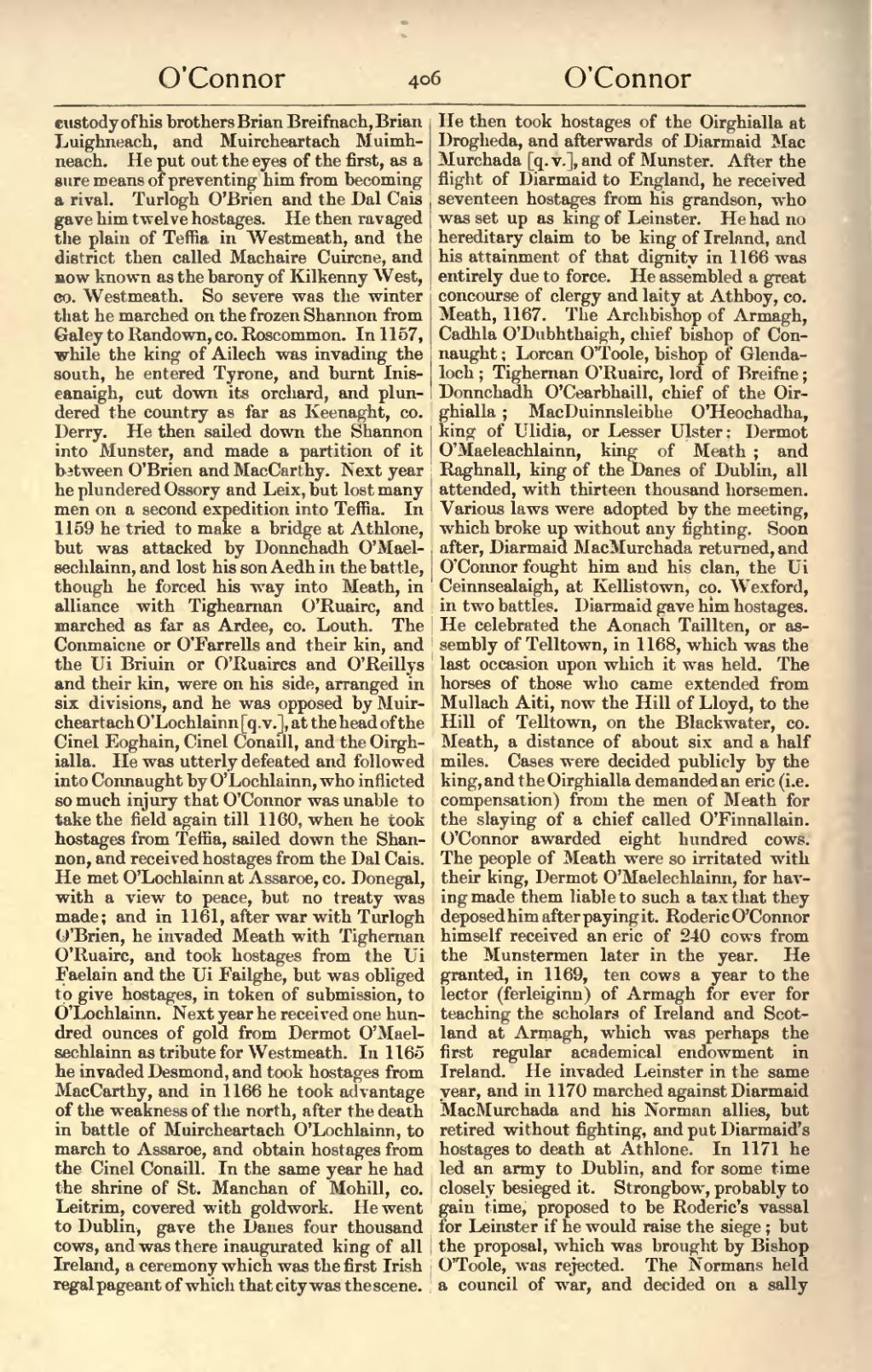custody of his brothers Brian Breifnach, Brian Luighneach, and Muircheartach Muimhneach. He put out the eyes of the first, as a sure means of preventing him from becoming a rival. Turlogh O'Brien and the Dal Cais gave him twelve hostages. He then ravaged the plain of Teffia in Westmeath, and the district then called Machaire Cuircne, and now known as the barony of Kilkenny West, co. Westmeath. So severe was the winter that he marched on the frozen Shannon from Galey to Randown, co. Roscommon. In 1157, while the king of Ailech was invading the south, he entered Tyrone, and burnt Iniseanaigh, cut down its orchard, and plundered the country as far as Keenaght, co. Derry. He then sailed down the Shannon into Munster, and made a partition of it between O'Brien and MacCarthy. Next year he plundered Ossory and Leix, but lost many men on a second expedition into Teffia. In 1159 he tried to make a bridge at Athlone, but was attacked by Donnchadh O'Maelsechlainn, and lost his son Aedh in the battle, though he forced his way into Meath, in alliance with Tighearnan O'Ruairc, and marched as far as Ardee, co. Louth. The Conmaicne or O'Farrells and their kin, and the Ui Briuin or O'Ruaircs and O'Reillys and their kin, were on his side, arranged in six divisions, and he was opposed by Muircheartach O'Lochlainn [q. v.], at the head of the Cinel Eoghain, Cinel Conaill, and the Oirghialla. He was utterly defeated and followed into Connaught by O'Lochlainn, who inflicted so much injury that O'Connor was unable to take the field again till 1160, when he took hostages from Teffia, sailed down the Shannon, and received hostages from the Dal Cais. He met O'Lochlainn at Assaroe, co. Donegal, with a view to peace, but no treaty was made; and in 1161, after war with Turlogh O'Brien, he invaded Meath with Tighernan O'Ruairc, and took hostages from the Ui Faelain and the Ui Failghe, but was obliged to give hostages, in token of submission, to O'Lochlainn. Next year he received one hundred ounces of gold from Dermot O'Maelsechlainn as tribute for Westmeath. In 1165 he invaded Desmond, and took hostages from MacCarthy, and in 1166 he took advantage of the weakness of the north, after the death in battle of Muircheartach O'Lochlainn, to march to Assaroe, and obtain hostages from the Cinel Conaill. In the same year he had the shrine of St. Manchan of Mohill, co. Leitrim, covered with goldwork. He went to Dublin, gave the Danes four thousand cows, and was there inaugurated king of all Ireland, a ceremony which was the first Irish regal pageant of which that city was the scene. He then took hostages of the Oirghialla at Drogheda, and afterwards of Diarmaid Mac Murchada [q. v.], and of Munster. After the flight of Diarmaid to England, he received seventeen hostages from his grandson, who was set up as king of Leinster. He had no hereditary claim to be king of Ireland, and his attainment of that dignity in 1166 was entirely due to force. He assembled a great concourse of clergy and laity at Athboy, co. Meath, 1167. The Archbishop of Armagh, Cadhla O'Dubhthaigh, chief bishop of Connaught; Lorcan O'Toole, bishop of Glendaloch; Tighernan O'Ruairc, lord of Breifne; Donnchadh O'Cearbhaill, chief of the Oirghialla; MacDuinnsleibhe O'Heochadha, king of Ulidia, or Lesser Ulster; Dermot O'Maeleachlainn, king of Meath; and Raghnall, king of the Danes of Dublin, all attended, with thirteen thousand horsemen. Various laws were adopted by the meeting, which broke up without any fighting. Soon after, Diarmaid MacMurchada returned, and O'Connor fought him and his clan, the Ui Ceinnsealaigh, at Kellistown, co. Wexford, in two battles. Diarmaid gave him hostages. He celebrated the Aonach Taillten, or assembly of Telltown, in 1168, which was the last occasion upon which it was held. The horses of those who came extended from Mullach Aiti, now the Hill of Lloyd, to the Hill of Telltown, on the Blackwater, co. Meath, a distance of about six and a half miles. Cases were decided publicly by the king, and the Oirghialla demanded an eric (i.e. compensation) from the men of Meath for the slaying of a chief called O'Finnallain. O'Connor awarded eight hundred cows. The people of Meath were so irritated with their king, Dermot O'Maelechlainn, for having made them liable to such a tax that they deposed him after paying it. Roderic O'Connor himself received an eric of 240 cows from the Munstermen later in the year. He granted, in 1169, ten cows a year to the lector (ferleiginn) of Armagh for ever for teaching the scholars of Ireland and Scotland at Armagh, which was perhaps the first regular academical endowment in Ireland. He invaded Leinster in the same year, and in 1770 marched against Diarmaid MacMurchada and his Norman allies, but retired without fighting, and put Diarmaid's hostages to death at Athlone. In 1171 he led an army to Dublin, and for some time closely besieged it. Strongbow, probably to gain time, proposed to be Roderic's vassal for Leinster if he would raise the siege; but the proposal, which was brought by Bishop O'Toole, was rejected. The Normans held a council of war, and decided on a sally
Page:Dictionary of National Biography volume 41.djvu/412
